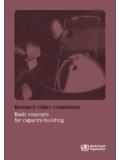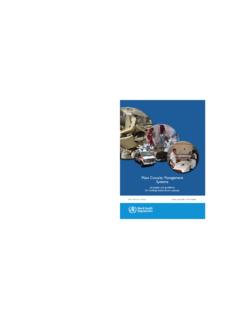Transcription of capacity building cover - OECD.org
1 capacity building 4/6/2005 1:18 PM Page 1. THE WORLD BANK W O R L D B A N K O P E R AT I O N S E VA L U AT I O N D E PA R T M E N T. World Bank Support for capacity building in Africa capacity building in Africa An OED Evaluation of World Bank Support opy e C. c dvan THE WORLD BANK A. The World ISBN 0-8213-6241-0 Bank capacity building 4/6/2005 1:07 PM Page 2. OPERATIONS EVALUATION DEPARTMENT OED PUBLICATIONS. ENHANCING DEVELOPMENT EFFECTIVENESS THROUGH EXCELLENCE AND INDEPENDENCE IN EVALUATION Study Series 2003 Annual Review of Development Effectiveness: The Effectiveness of Bank Support for Policy Reform The Operations Evaluation Department (OED) is an independent unit within the World Bank; it reports directly to the Agricultural Extension: The Kenya Experience Assisting Russia's Transition: An Unprecedented Challenge Bank's Board of Executive Directors.
2 OED assesses what works, and what does not; how a borrower plans to run and Bangladesh: Progress Through Partnership maintain a project; and the lasting contribution of the Bank to a country's overall development. The goals of evaluation Bridging Troubled Waters: Assessing the World Bank Water Resources Strategy are to learn from experience, to provide an objective basis for assessing the results of the Bank's work, and to provide The CGIAR: An Independent Meta-Evaluation of the Consultative Group on International Agricultural Research accountability in the achievement of its objectives. It also improves Bank work by identifying and disseminating the les- Debt Relief for the Poorest: An OED Review of the HIPC Initiative Developing Towns and Cities: Lessons from Brazil and the Philippines sons learned from experience and by framing recommendations drawn from evaluation findings.
3 The Drive to Partnership: Aid Coordination and the World Bank Financial Sector Reform: A Review of World Bank Assistance Financing the Global Benefits of Forests: The Bank's GEF Portfolio and the 1991 Forest Strategy and Its Implementation Fiscal Management in Adjustment Lending IDA's Partnership for Poverty Reduction Improving the Lives of the Poor Through Investment in Cities India: The Dairy Revolution Information Infrastructure: The World Bank Group's Experience Investing in Health: Development Effectiveness in the Health, Nutrition, and Population Sector Jordan: Supporting Stable Development in a Challenging Region Lesotho: Development in a Challenging Environment Mainstreaming Gender in World Bank Lending: An Update The Next Ascent: An Evaluation of the Aga Khan Rural Support Program, Pakistan Nongovernmental Organizations in World Bank Supported Projects: A Review Poland Country Assistance Review: Partnership in a Transition Economy Poverty Reduction in the 1990s: An Evaluation of Strategy and Performance Power for Development: A Review of the World Bank Group's Experience with Private Participation in the Electricity Sector Promoting Environmental Sustainability in Development Reforming Agriculture: The World Bank Goes to Market Sharing Knowledge: Innovations and Remaining Challenges Social Funds: Assessing Effectiveness Uganda.
4 Policy, Participation, People The World Bank's Experience with Post-Conflict Reconstruction The World Bank's Forest Strategy: Striking the Right Balance Zambia Country Assistance Review: Turning an Economy Around Evaluation Country Case Series Bosnia and Herzegovina: Post-Conflict Reconstruction Brazil: Forests in the Balance: Challenges of Conservation with Development Cameroon: Forest Sector Development in a Difficult Political Economy China: From Afforestation to Poverty Alleviation and Natural Forest Management Costa Rica: Forest Strategy and the Evolution of Land Use El Salvador: Post-Conflict Reconstruction India: Alleviating Poverty through Forest Development Indonesia: The Challenges of World Bank Involvement in Forests Uganda: Post-Conflict Reconstruction Proceedings Global Public Policies and Programs: Implications for Financing and Evaluation Lessons of Fiscal Adjustment Lesson from Urban Transport Evaluating the Gender Impact of World Bank Assistance Evaluation and Development: The Institutional Dimension (Transaction Publishers).
5 Evaluation and Poverty Reduction Monitoring & Evaluation capacity Development in Africa Public Sector Performance The Critical Role of Evaluation Multilingual Editions All gement de la dette pour les plus pauvres : Examen OED de l'initiative PPTE. Appr ciation de l'efficacit du d veloppement : L' valuation la Banque mondiale et la Soci t financi re internationale Determinar la eficacia de las actividades de desarrollo : La evaluaci n en el Banco Mundial y la Corporaci n Financiera Internacional C te d'Ivoire : Revue de l'aide de la Banque mondiale au pays Filipinas: Crisis y oportunidades Reconstruir a Economia de Mo ambique WORLD BANK OPERATIONS EVALUATION DEPARTMENT. capacity building in Africa An OED Evaluation of World Bank Support 2005.
6 The World Bank Washington, 2005 The International Bank for Reconstruction and Development / The World Bank 1818 H Street, NW. Washington, DC 20433. Telephone: 202-473-1000. Internet: E-mail: All rights reserved Manufactured in the United States of America First edition April 2005. The findings, interpretations, and conclusions expressed here are those of the author(s) and do not necessarily reflect the views of the Board of Executive Directors of the World Bank or the governments they represent. The World Bank cannot guarantee the accuracy of the data included in this work. The boundaries, colors, denominations, and other information shown on any map in the work do not imply on the part of the World Bank any judgment of the legal status of any territory or the endorsement or acceptance of such boundaries.
7 Rights and Permissions The material in this publication is copyrighted. Copying and/or transmitting portions or all of this work without permission may be a violation of applicable law. The World Bank encourages dissemination of its work and will normally grant permission promptly. For permission to photocopy or reprint any part of this work, please send a request with complete information to the Copyright Clearance Center, Inc., 222 Rosewood Drive, Danvers, MA 01923, USA, telephone 978-750-8400, fax 978- 750-4470, All other queries on rights and licenses, including subsidiary rights, should be addressed to the Office of the Publisher, World Bank, 1818 H Street NW, Washington, DC 20433, USA, fax 202-522-2422, e-mail cover photo courtesy of the World Bank Photo Library.
8 ISBN 0-8213-6241-0. e-ISBN 0-8213-6242-9. Library of Congress Cataloging-in-Publication data have been applied for. World Bank InfoShop Operations Evaluation Department E-mail: Knowledge Programs and Evaluation capacity Telephone: 202-458-5454 Development (OEDKE). Facsimile: 202-522-1500 E-mail: Telephone: 202-458-4497. Facsimile: 202-522-3125. Printed on Recycled Paper Contents v Acknowledgments vii Foreword xi Acronyms and Abbreviations xiii Summary of Findings and Recommendations 1 1 Introduction 5 2 Assessing Support for capacity building in the Public Sector 5 capacity building not a well-defined practice 7 Key features of capacity building 8 Bank capacity building support to Africa 9 Evaluation approach 13 3 Relevance: Making capacity building a Goal 13 Aligning support with country priorities and needs 16 Designing interventions to meet needs and demands for change 18 Monitoring, evaluating, and using the lessons of experience 19 4 Efficacy.
9 Adapting Interventions to Country and Sector Conditions 19 The overall record 21 Achieving capacity building objectives in diverse country and sector conditions 31 The quality of the inputs 33 Toward more coherent capacity building 35 5 Providing capacity building Support through Corporate and Regional Mechanisms 35 The World Bank Institute 39 The African capacity building Foundation 41 The Institutional Development Fund 42 The overall value added 43 6 Findings and Recommendations 43 Main findings 45 Recommendations iii C A PA C I T Y B U I L D I N G I N A F R I C A : A N O E D E V A L U AT I O N O F W O R L D B A N K S U P P O R T. 47 Annexes 47 A: A Selection of Prior Bank Assessments of Its capacity building Support 51 B: Methodology Note 55 C: Country Case Study Missions 57 D: Lists of Projects, CASs, and ESW Reviewed 63 E: Africa Staff Survey 67 F: capacity building in the Bank's Africa Regional Strategies 69 G: Activities of the African capacity building Foundation 71 H: Management Action Record 73 Endnotes 79 Bibliography Boxes 6 : Different Donor Definitions of capacity building 7 : Early Calls for a New capacity building Perspective 14 : New Multisector Projects Integrate Essential capacity building Elements into Project Design 24 : Four capacity building Achievements in the Roads Sector 26 : building capacity to Facilitate Decentralization.
10 The Case of Burkina Faso's Health and Nutrition Project 27 : Human Resource Management in Health: The Need for a Comprehensive Approach in Ghana 28 : A Well-Sequenced Approach to capacity building in the Education Sector in Ghana 30 : Five Ways to Improve capacity building in Public Financial Management 31 : Project Implementation Units Shortchange Development of Sustainable capacity 32 : A Promising New Approach to Training: Decentralization in Uganda 38 : building Professional Networks to Meet Knowledge Needs in Africa Figures 10 : capacity building Results Chain and Evaluation Scope 20 : Public Sector and Technical Assistance Projects in Africa Are Less Successful than Bankwide Average 23 : Challenges to Improving Government Performance Vary across Sectors 36 : Thematic Distribution of FY04 WBI Offerings in Africa 37 : WBI's FY05 Budget Expenditures (including trust funds).














